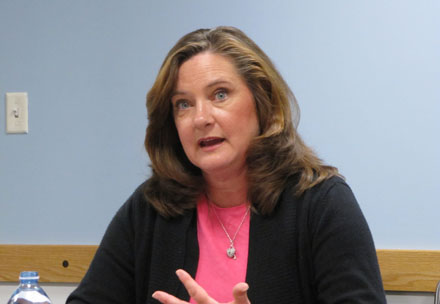Event
Bloomberg editor: Super PACs add negativity to primary race

March 20, 2012 – Super PACs (political action committees) and large donors have impacted the 2012 presidential race in surprising ways, said Jeanne Cummings, Government Team Deputy Editor for Bloomberg News, at a Shorenstein Center event.
An unexpected result of changes in campaign financing, Cummings said, is that candidates in the GOP primary race each have their own PACs and “use them against one another.” Of the over 70 million dollars that has been spent by Super PACs, she said, “all but about 6 million of it has been Republican on Republican.”
Cummings pointed out that for Romney, Santorum and Gingrich, the negative ads funded by Super PACs have yielded an “increase in unfavorable [ratings], all driven by their own party colleagues.”
“A development we didn’t anticipate,” said Cummings, is the “entry of millionaires whose new toy is a presidential campaign, and the way that they have managed to, quite publicly, float candidates longer than any political, Darwinian theory would have allowed them to survive.”
At the beginning of the 2012 primary campaign, the GOP strategy seemed to be to imitate the Obama/Clinton campaign from 2008, Cummings said. While the current race has been prolonged just as it was in ’08, the two primary seasons have little else in common, she argued. Obama managed to “build behind him” in every state he campaigned in during the primary, so when he campaigned in the general election, he was able to draw from an already strong and organized base. However, Cummings said, Romney will have to “recreate everything he created during the primary” if he wins the nomination, because he has not been able to maintain state offices, post-primary. While Obama emerged from the primary “stronger,” the Republicans’ frontrunner is “getting weaker and weaker as the process goes on.”
By Janell Sims, Shorenstein Center.
Photos by Heather McKinnon, Shorenstein Center.